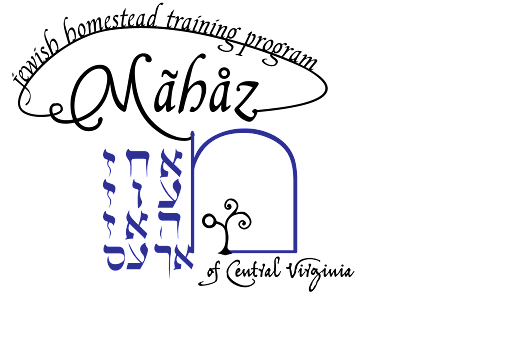
Program Description
Mahaz fellows will live, learn, and work together. Applicants should be ready to immerse themselves in the daily activities, responsibilities, and rhythms of working on a production-oriented and community-based farm. Through the duration of the program, Fellows will have a chance to learn a diverse set of field skills related to regenerative agriculture, as well as gain an introductory exposure to a range of skills applicable to the foundation of homesteading arts and tending the wild.
Fellows will work directly with our Farm Managers and farm team through their work in the field. A core focus of the program will be working with our horticultural projects - vegetable & medicinal gardens, fruit & nut orchards, ecological landscaping, etc. Aside from the core field work, the program also offers a robust enrichment curriculum, which includes weekly classes related to agriculture, ecological crafts, Jewish studies, and more, as taught by our farm team and guest educators. As community is a central part of this experience, there will be time designated on a weekly basis to connect, share, and foster a nourishing community culture.
Program Content
Our weekly schedule runs Monday to Friday from 8am - 5pm. There will be one communal Shabbaton per month, as well as evening community programming occurring 3 - 4 times on a monthly basis. Below is a general description of our program content.
Field Hours (approx. 16 hrs/week)
Fellows will spend at least two full days a week working within a range of field departments on the farms. Core farm responsibilities will vary depending on seasonal and project-based needs. Regular activities may involve planting / weeding / irrigating in the gardens; collecting / washing eggs; assisting with animal care, preservation in the pantry kitchen; herbal processing in the apothecary; landscaping; forestry; etc.
Enrichment Curriculum: consists of one of the following subjects: (approx. 16 hrs/week)
Intro to farming - Through a combination of lectures, group discussions, and hands-on instruction, fellows will learn the basics of agricultural and homesteading skills. Topics to be covered includes learning how to build your own garden bed, maintain healthy soil, how to compost and much more!
Jewish Studies - delve into the cycles, rhythms, and themes of our Jewish tradition within the context of agricultural practices and land stewardship.
Homesteading Arts - Fellows will have the opportunity to learn a skill or craft related to homesteading life. We invite our own staff as well as a number of local educators to share their passion and expertise with the fellows. In the past, we’ve explored topics such as bush-crafting, wood-working, cobb-building, leather-work, broom-making, and fermentation to name just a few.
Community Circle: (approx. 2 hrs/week)
We believe that it truly “takes a village”, and this four month experience is held and supported by the people around us. That is why we have dedicated time in our schedule to communicate around needs and vision for a healthy and thriving community life. Additionally, there will be many more opportunities through-out the summer when we gather to co-create and celebrate together, such as for shabbat, holidays, and other programmed activities. (see our FAQs for more info on this)
Program Fees
Mahaz operates as a work trade model, so there is no tuition fee. In exchange for an average of 16 hrs of work a week (of which will also have immense educational value), fellows will receive room, board and weekly farm harvests. Additionally, fellows will receive over 10 hours a week of educational and enrichment content that covers the many aspects of homesteading life. Fellows will also receive a monthly stipend of $600 to cover any additional living costs. Payments are twice monthly, and are conditional upon full program participation and attendance.
Mahaz envisions this fellowship program as an investment into a small number of individuals who are seeking to develop and deepen their relationship with the natural world. While the actual cost of this program is considerably higher per fellow, the tuition has been subsidized to allow this opportunity to be accessible for everyone. In lieu of tuition, we ask the fellows to fully invest in field work, classes, and community programming, which means arriving promptly, prepared, and willing.
Application Process
The ideal applicants for the Mahaz program are individuals who:
Can commit to the full duration of the program.
Are in the age range of 21 - 35 (couples may apply together).
Are in good health and are ready for physical, hands-on work.
Have a strong interest in learning about regenerative agriculture and ecological stewardship.
Have an interest in connecting their Jewish identity with the ecological / agricultural context.
Enjoy learning and growing in a community context, and working in a collaborative team setting.
Are comfortable in a multi-faith, multicultural setting and are respectful of all Jewish practices.
Are responsible, accountable and reliable; Value honest, respectful, and clear communication in a mature manner.
If this sounds like it may be a right match for you, we would be glad to hear from you and connect further!
Applications will be accepted until Febuary 15th, and we recommend submitting applications early, as there are a limited number spaces available. Once received, Mahaz administration will be in touch with potential candidates to schedule an interview. An additional follow-up interview may be scheduled if necessary.
Testimonials
